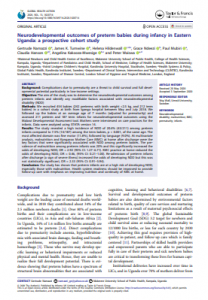
Complications due to prematurity and low birth weight are the leading cause of neonatal deaths worldwide, and in 2018 they contributed about 34% of the
2.5 million newborn deaths [1]. Over 80% of preterm births and their complications are in low-income countries (LICs), in Asia and sub-Saharan Africa [2].
In Uganda, 14% of 1.6 million live births annually are estimated to be preterm [3,4]. Direct complications due to prematurity include anemia, hyperbilirubinemia with associated brain damage, feeding and breathing problems, retinopathy, and intracranial hemorrhage [5]. Those who survive may develop specific learning or behavioral impairments or reduced physical and mental health. Hence, they are unable to realize their full development potential. There is evidence showing that preterm babies have a spectrum of structural brain abnormalities that are associated with cognitive, learning and behavioral disabilities [6,7].
Survival and developmental outcomes of preterm babies are also determined by environmental factors related to birth, quality of care services and nurturing
limitations as a result of maternal psychosocial effects of preterm birth [8,9]. The global Sustainable Development Goal (SDG) 3.2 target for newborn and
child survival aims at reducing neonatal mortality to 12/1000 live births, or less for each country by 2030 [10]. Achieving this goal requires provision of highquality in-patient, and follow-up care which is family centered [11]. Partnerships of skilled health providers and empowered parents who are able to participate
fully in care of their preterm and sick newborn babies are critical to transforming these lives for human capital development.